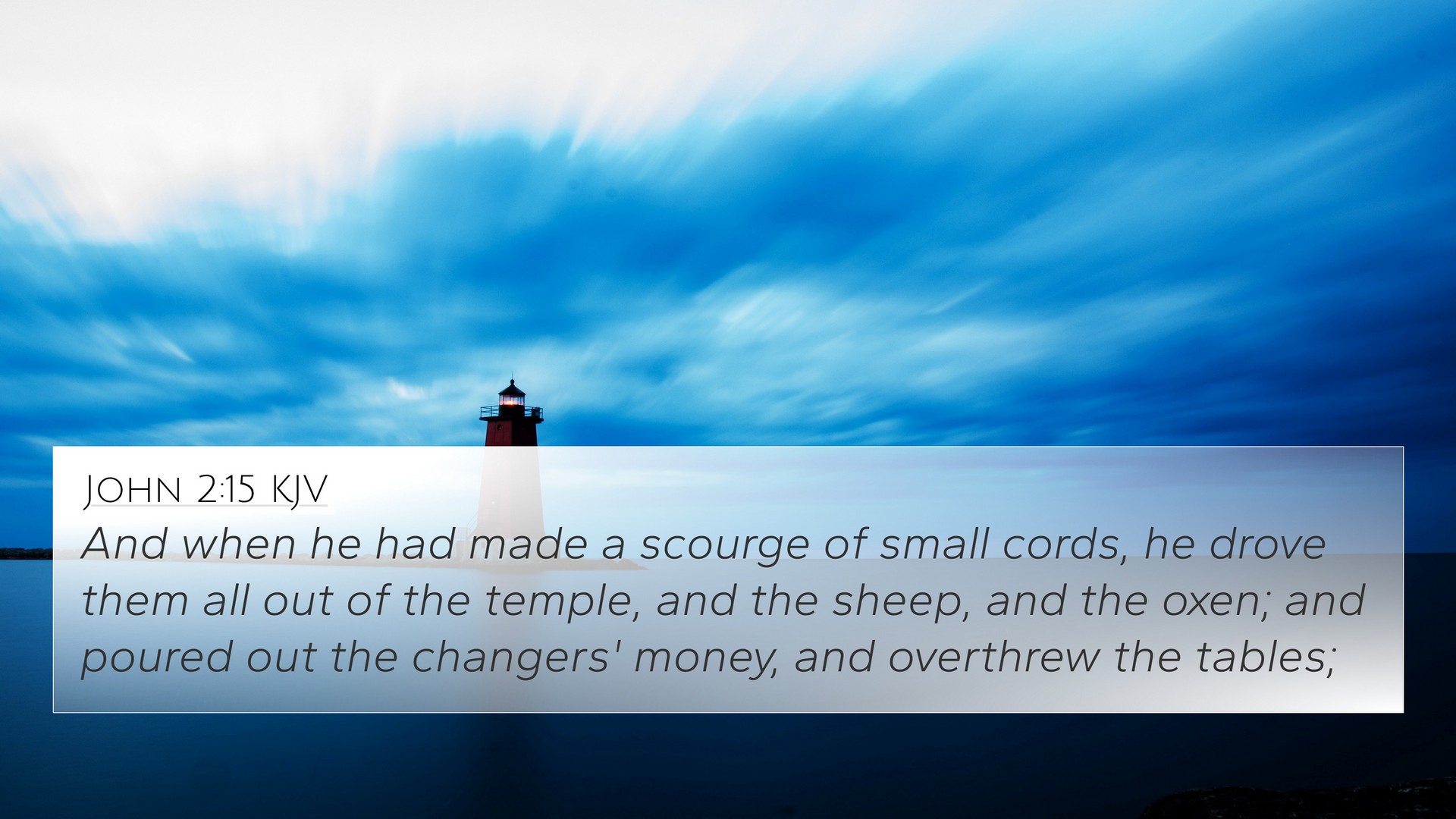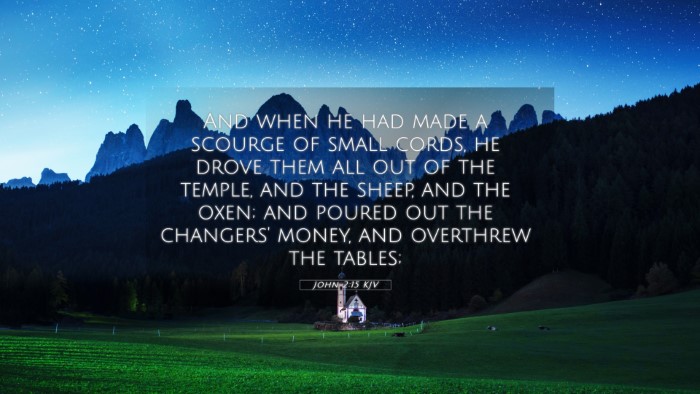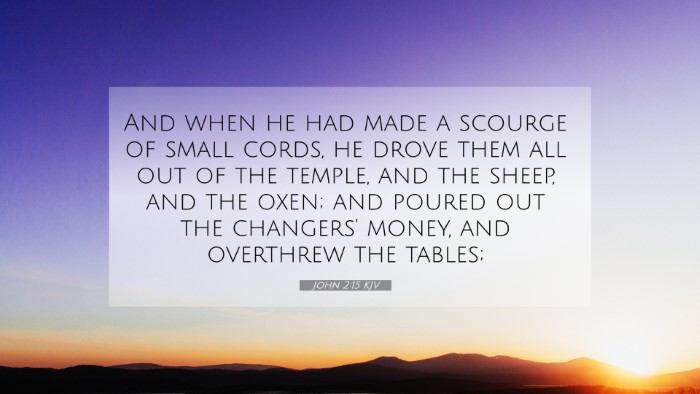Old Testament
Genesis Exodus Leviticus Numbers Deuteronomy Joshua Judges Ruth 1 Samuel 2 Samuel 1 Kings 2 Kings 1 Chronicles 2 Chronicles Ezra Nehemiah Esther Job Psalms Proverbs Ecclesiastes Song of Solomon Isaiah Jeremiah Lamentations Ezekiel Daniel Hosea Joel Amos Obadiah Jonah Micah Nahum Habakkuk Zephaniah Haggai Zechariah MalachiJohn 2:15 Similar Verses
John 2:15 Cross References
And when he had made a scourge of small cords, he drove them all out of the temple, and the sheep, and the oxen; and poured out the changers' money, and overthrew the tables;
Uncover the Rich Themes and Topics of This Bible Verse
Listed below are the Bible themes associated with John 2:15. We invite you to explore each theme to gain deeper insights into the Scriptures.
John 2:15 Cross Reference Verses
This section features a detailed cross-reference designed to enrich your understanding of the Scriptures. Below, you will find carefully selected verses that echo the themes and teachings related to John 2:15 KJV. Click on any image to explore detailed analyses of related Bible verses and uncover deeper theological insights.
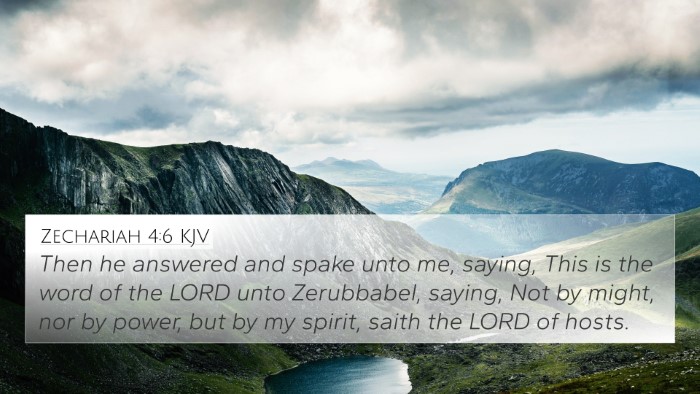
Zechariah 4:6 (KJV) »
Then he answered and spake unto me, saying, This is the word of the LORD unto Zerubbabel, saying, Not by might, nor by power, but by my spirit, saith the LORD of hosts.
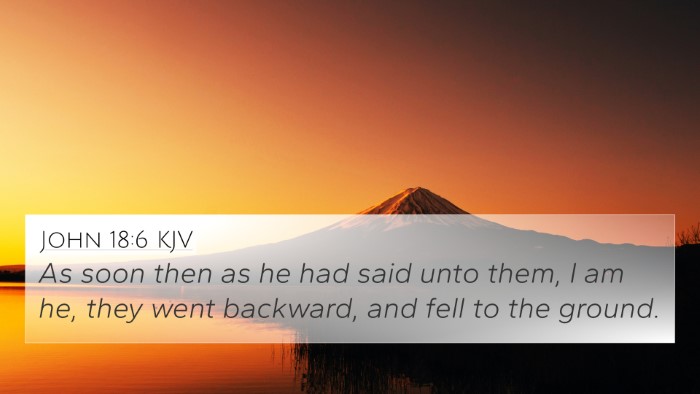
John 18:6 (KJV) »
As soon then as he had said unto them, I am he, they went backward, and fell to the ground.

2 Corinthians 10:4 (KJV) »
(For the weapons of our warfare are not carnal, but mighty through God to the pulling down of strong holds;)
John 2:15 Verse Analysis and Similar Verses
Understanding John 2:15
John 2:15 states:
"And when he had made a scourge of small cords, he drove them all out of the temple, and the sheep, and the oxen; and poured out the changers' money, and overthrew the tables."
Context and Importance
John 2:15 is a pivotal moment in the New Testament, where Jesus demonstrates his righteous anger against commercialism and corruption within the sacred space of the temple. This event is often referred to as "Jesus cleansing the temple." The context is critical: Jesus arrives in Jerusalem during Passover, and what should be a time of reverence and worship has been turned into a marketplace.
Interpretation and Analysis
Various biblical commentators provide insight into the deeper meaning of this verse:
-
Matthew Henry:
Henry emphasizes that Jesus's actions were motivated by zeal for God's house. He views the temple as a symbol of God's presence and holiness, and the commercialization within it as a direct affront to that sanctity. Jesus’s use of a scourge indicates a serious call to restore reverence in worship.
-
Albert Barnes:
Barnes highlights the historical context, noting that the temple had become a hub of commerce to the detriment of its sacred purpose. He explains that the money changers were necessary for converting currency but had created an inappropriate business atmosphere that hindered genuine worship.
-
Adam Clarke:
Clarke takes a more theological approach, suggesting that this incident foreshadows the broader rejection of Jesus by the religious authorities. He interprets Jesus's actions as a precursor to the judgment of the temple system itself, underscoring the need for a new understanding of worship in spirit and truth.
Thematic Bible Verse Connections
John 2:15 can be connected to several other scriptures that address themes of purity in worship and God’s desire for sincere devotion:
- Matthew 21:12-13: This passage recounts a similar event where Jesus drives out the money changers, reinforcing the theme of temple purity.
- Isaiah 56:7: “For My house shall be called a house of prayer for all nations”—this verse aligns with Jesus’s intent to restore the temple’s purpose.
- 1 Corinthians 3:16-17: Paul emphasizes the importance of holiness within God’s presence, analogous to Jesus’ concern for the temple.
- Malachi 1:14: God’s demand for reverence in worship echoes the corrective action taken by Jesus in the temple.
- Luke 19:46: Another account of Jesus cleansing the temple emphasizes the same mission to restore the sacredness of worship spaces.
- John 4:24: Jesus speaks about true worshipers worshiping in spirit and truth; this reflects the transformative vision Jesus had for worship.
- Revelation 21:22: Imagery of eternal worship in God’s presence connects to the intent behind the temple's sanctity.
Cross-Referencing Biblical Texts
Cross-referencing can deepen the understanding of John 2:15:
- Understanding Jesus's authority: Matthew 21:23-27 illustrates Jesus’s authority in the temple.
- Defining worship: Hebrews 10:19-22 emphasizes accessing God through sincere worship.
- Condemnation of hypocrisy: Mark 11:15-19 reflects on Jesus judging those who misused the temple.
- God's jealousy for worship: Exodus 20:5 warns against idolatry, revealing God’s nature regarding worship.
- Judgement and restoration: Jeremiah 7:11 explores God’s displeasure with false worship in the temple.
- The future of true worship: John 2:19-21 speaks about the temple of Jesus's body, which brings a new understanding of God's dwelling among humans.
Bible Study Tools
For a comprehensive study of John 2:15 and its themes, utilizing tools and resources can enhance one’s understanding:
- Bible concordance for locating relevant verses.
- Bible cross-reference guide to trace connections between different passages.
- Cross-reference Bible study methods for thematic exploration.
- Tools for Bible cross-referencing to facilitate deeper analysis.
- Comprehensive Bible cross-reference materials for thorough study.
Application for Today
The cleansing of the temple calls for reflection on our personal worship practices:
- Purity of Worship: Ensuring that our worship is sincere and free from distractions.
- Corporate Worship: Acknowledging the communal aspect of worship and the need for reverence in church settings.
- Commercialism in Faith: Reflecting on how modern practices might overshadow genuine worship.
Conclusion
In conclusion, John 2:15 serves as a critical reminder of the importance of purity and sincerity in our relationship with God. By studying this scripture alongside related verses, we gain a holistic understanding of divine expectations for worship, as well as its implications for modern believers. As we engage in comparative Bible verse analysis, we can appreciate the interconnectedness of biblical themes and their relevance to our lives today.
